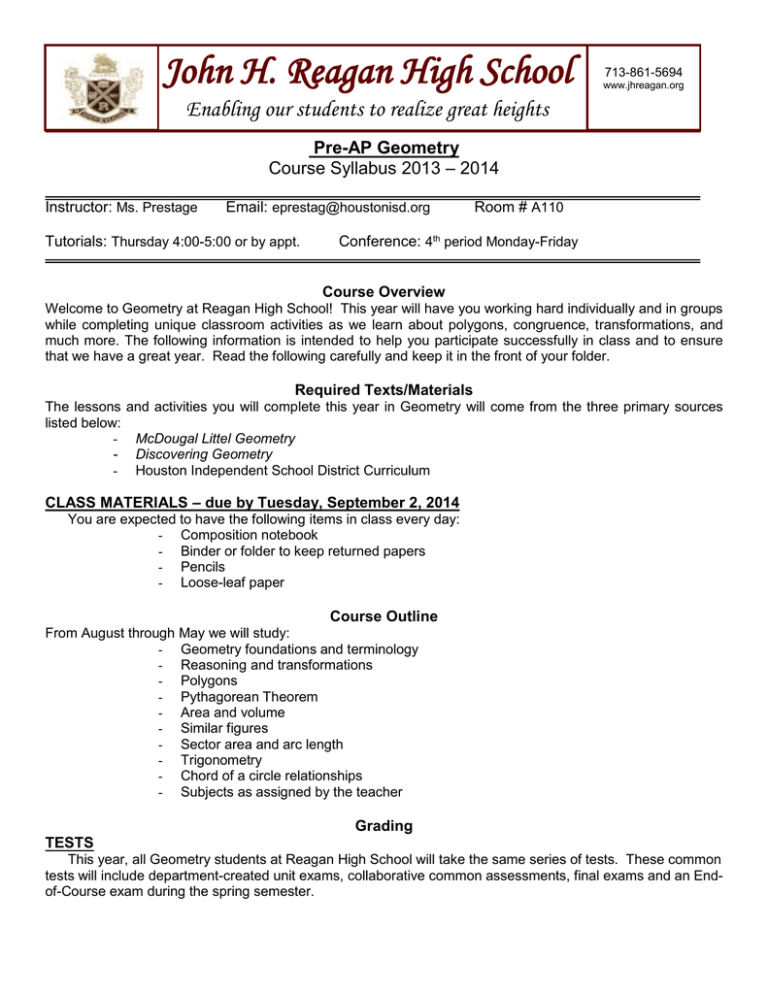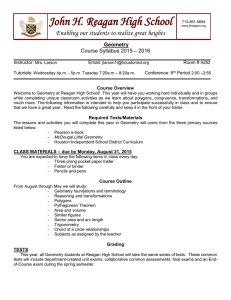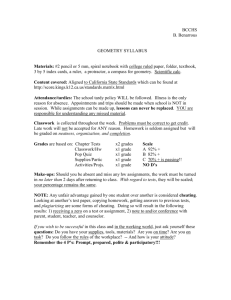Geometry Pre-AP Syllabus
advertisement

John H. Reagan High School 713-861-5694 www.jhreagan.org Enabling our students to realize great heights Pre-AP Geometry Course Syllabus 2013 – 2014 Instructor: Ms. Prestage Email: eprestag@houstonisd.org Tutorials: Thursday 4:00-5:00 or by appt. Room # A110 Conference: 4th period Monday-Friday Course Overview Welcome to Geometry at Reagan High School! This year will have you working hard individually and in groups while completing unique classroom activities as we learn about polygons, congruence, transformations, and much more. The following information is intended to help you participate successfully in class and to ensure that we have a great year. Read the following carefully and keep it in the front of your folder. Required Texts/Materials The lessons and activities you will complete this year in Geometry will come from the three primary sources listed below: - McDougal Littel Geometry - Discovering Geometry - Houston Independent School District Curriculum CLASS MATERIALS – due by Tuesday, September 2, 2014 You are expected to have the following items in class every day: - Composition notebook - Binder or folder to keep returned papers - Pencils - Loose-leaf paper Course Outline From August through May we will study: - Geometry foundations and terminology - Reasoning and transformations - Polygons - Pythagorean Theorem - Area and volume - Similar figures - Sector area and arc length - Trigonometry - Chord of a circle relationships - Subjects as assigned by the teacher Grading TESTS This year, all Geometry students at Reagan High School will take the same series of tests. These common tests will include department-created unit exams, collaborative common assessments, final exams and an Endof-Course exam during the spring semester. PROJECTS Throughout the semester you will complete several projects to further enhance our learning experience in this class. Each project will center on an important concept being discussed in class and will be done individually or in a group (depending on the assignment). A rubric will be given before the due date in order to inform you of the project’s expectations. Projects are always due on their due date. You will usually have three weeks to work on a project. If there is an issue during that time period that prevents you from turning in your project on time please talk with me. I have materials and resources to assist you in your learning. A project may be turned in early for extra credit if it is a quality product. If it does not meet the standard to show proficiency it will be returned and you may make the necessary corrections. Do not throw something together just to get the extra credit points but lose points on content. GRADING SCALE Assessment Test/Quiz 40% Projects 20% Class / Daily work Daily Work and Participation 40% HOMEWORK Expect to have homework every night. This is a very important activity in learning Geometry, and I expect you to attempt every question. Discuss any problem with me concerning an inability to turn in work on time. ABSENCES If you are absent it is your responsibility to see Ms. Prestage for the make-up work. If absent the day an assignment is assigned you will be given the same time limit the rest of your classmates received. If absent the day a project is due you are still responsible for turning it in on time. TARDY POLICY You are unexcused tardy if you enter the classroom without an appropriate pass any time after the bell begins ringing. On your third tardy you will be assigned detention and for every tardy after the third. You will have one week of grace period to perfect your route to this class. RESTROOM POLICY You will be afforded three opportunities to leave the room to use the restroom each semester. This averages to one per six weeks. You may not “borrow” passes from other students. Only students with ID badges will be allowed to leave to use the restroom. Speak with me if you have a medical problem. It must be filed with the school nurse. At the end of the semester extra credit will be given on your final exam for any restroom passes not used. PLAGIARISM/CHEATING There is no intellectual offense more serious than plagiarism in academic and professional contexts. Cheating undermines the necessary trust between students and teachers and is unacceptable conduct. Students who engage in cheating or plagiarism will be subject to academic consequences, including a lowered or failing grade in a course as well as the possibility of additional administrative actions. I am always doing that which I cannot do, in order that I may learn how to do it. – Pablo Picasso(1881 1973) Education is a progressive discovery of our own ignorance. – Will Durant

